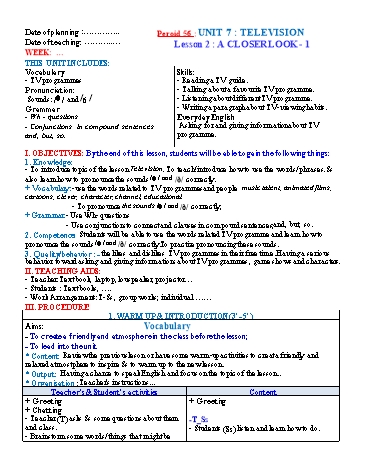Giáo án Tiếng Anh Lớp 6 (Global success) - Period 56 - Unit 7: Television. Lesson 2: A Closer look 1
Bạn đang xem tài liệu "Giáo án Tiếng Anh Lớp 6 (Global success) - Period 56 - Unit 7: Television. Lesson 2: A Closer look 1", để tải tài liệu gốc về máy hãy click vào nút Download ở trên.
Tóm tắt nội dung tài liệu: Giáo án Tiếng Anh Lớp 6 (Global success) - Period 56 - Unit 7: Television. Lesson 2: A Closer look 1

Date of planning:.. Peroid 56 : UNIT 7 : TELEVISION Date of teaching: .. Lesson 2 : A CLOSER LOOK - 1 WEEK: THIS UNIT INCLUDES: Vocabulary Skills: - TV programmes - Reading a TV guide. Pronunciation: - Talking about a favourite TV programme. Sounds: / / and /ð / - Listening about different TV programme. Grammar - Writing a paragraph about TV-viewing habits. - Wh - questions Everyday English - Conjunctions in compound sentences: Asking for and giving information about TV and, but, so. programme. I. OBJECTIVES: By the end of this lesson, students will be able to gain the following things: 1. Knowledge: - To introduce topic of the lesson Television. To teach/ introduce how to use the words/ phrases. Ss also learn how to pronounce the sounds / / and /ð/ correctly. + Vocabulary: -use the words related to TV programmes and people: music talent; animated films; cartoons; clever; character; channel; educational - To pronounce the sounds / / and /ð/ correctly; + Grammar: - Use Wh- questions - Use conjunctions to connect and clauses in compound sentences;and, but, so. 2. Competence: Students will be able to use the words related TV programme and learn how to pronounce the sounds / / and /ð/ correctly.To practice pronouncing these sounds. 3. Quality/ behavior :- the likes and dislikes TV programmes in their free time. Having a serious behavior toward asking and giving informations about TV programmes , game shows and characters. II. TEACHING AIDS: - Teacher: Text book, laptop, louspeaker, projector - Students : Text books, . - Work Arrangements: T-Ss , group works; individual III. PROCEDURE: 1. WARM UP & INTRODUCTION (3’- 5’) Aims: Vocabulary - To create a friendly and atmosphere in the class before the lesson; - To lead into the unit * Content: Review the previous leson or have some warm-up activities to creat a friendly and relaxed atmostphere to inspire Ss to warm up to the new lesson. * Output: Having a chance to speak English and focus on the topic of the lesson.. * Organisation :Teacher’s instructions... Teacher’s & Student’s activities Content + Greeting + Greeting + Chatting - Teacher (T) asks Ss some questions about them -T_Ss and class. - Students (Ss) listen and learn how to do. - Brainstorm some words/ things that might be - Check their answers as a class. - Give the answers - T may go around to observe and offer help if Key: necessary. 1. channel 2. character 3. animated films 4. game show 5. comedies 6. viewers ACTIVITY 3: Aim:To teach Ss more adjectives to describe television programmes and characters. * Content: Introduce some new words . Complete the sentences with adjectives given. * Output: Ss learn more new adjectives to describe television programmes and characters * Organisation : ... 3. Complete the sentences with the adjectives in 3. Complete the sentences with the the box. adjectives in the box. - Teach the new words (live with a different - Listen to the instructions clearly meaning from the one they already know, and - Learn how to do it popular). - Ss to work individually Suggestion: + popular: You play football, I play football, Nam plays football... -> Football is popular. - popular. + live: The contest is NOW at the City Hall. We - live are at home but we can watch what is happening - T_Ss there like the audience at the Hall. -> We are watching the competition live. - Ss do themselves. - T may ask Ss to give the Vietnamese equivalent - Copy them of these words. Key: - Ask Ss to work independently or in pairs. 1. popular 2. boring 3. cute 4. live Encourage them to read the sentences carefully 5. funny 6. educational and look for clues so that they can choose the right word to complete each sentence. - Check their answers as a class. - T may ask other Ss to give comments II. PRONUNCIATION: / / and /ð/ (10’- 12’) ACTIVITY 4: Aim: To help Ss identify how to pronounce the sounds / / and /ð/ and practise pronouncing these sounds. * Content: Pronounce the sounds / / and /ð/. * Output: Ss can identify how to pronounce the sounds / / and /ð/ correctly. * Organisation : .... 4. Listen and repeat the words. 4. Listen and repeat the words. - The / / and /ð/ sounds are among the most - T_Ss difficult English sounds for Vietnamese Ss as we - Listen to the teacher’s instructions carefully do not have them in our language. - Ask Ss to read the words first as they are all - Check the answers familiar with Ss. - Play the recording and ask Ss to listen carefully - Listen and repeat and check if they have pronounced them correctly.
File đính kèm:
 giao_an_tieng_anh_lop_6_global_success_period_56_unit_7_tele.docx
giao_an_tieng_anh_lop_6_global_success_period_56_unit_7_tele.docx

